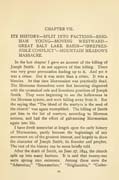
[p. 61]
CHAPTER VII.
ITS HISTORY—SPLIT INTO FACTIONS—BRIGHAM YOUNG—MOVING WESTWARD—GREAT SALT LAKE BASIN—"IRREPRESSIBLE CONFLICT"—MOUNTAIN MEADOWS MASSACRE.
In the last chapter I gave an account of the killing of Joseph Smith. I do not approve of that killing. There was very great provocation leading up to it. And yet it was a crime. But it was more than a crime. It was a blunder. At that time Mormonism was practically dead. The Mormons themselves were fast becoming disgusted with the tyrannical rule and licentious practices of Joseph Smith. They were beginning to see the hollowness in the Mormon system, and were falling away from it. But the saying that "The blood of the martyrs is the seed of the church" was again exemplified. The killing of Smith put him in the list of martyrs, according to Mormon notions, and had the effect of galvanizing Mormonism again into life.
I have dwelt somewhat at length upon the early history of Mormonism, partly because the beginnings of any movement are of the greatest interest, and largely to show the character of Joseph Smith, its founder and prophet. The rest of the history can be more briefly told.
After the death of Smith, on June 27, 1844, the church split up into many factions. It is said that twenty-one sects sprang into existence. Among these were the "Adamsites," "Brewsterites," "Brighamites," "Cutler-
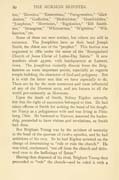
[p. 62]
ites," "Doveites," "Enimettites," "Forsgreenites," "Gladdenites," "Godbeites," "Hedrickites," Hendrickites," "Josephites," "Morrisites," "Rigdonites," "Bill Smithites," "Strangites," " Whitinerites," "Wightites," "Williamites," etc.
Some of these are now extinct, but others are still in existence. The Josephites have as their head Joseph Smith, the eldest son of the "prophet." This faction was organized in 1860 under the name of the "Reorganized Church of Jesus Christ of Latter-Day Saints." It now numbers about 45,000, with headquarters at Lamoni, Iowa. The Josephites violently dissent from the Brighamites on some important points, especially as regards temple building, the character of God and polygamy. But it is with the latter sect that we have especially to do. These are by far the most numerous and most influential of any of the Mormon sects, and are known to all the world pre-eminently as Mormons.
Upon the death of Smith, Sidney Rigdon naturally felt that the right of succession belonged to him. He had taken offense at Smith for seeking the hand of his daughter Nancy as a polygamous wife and was living in Pittsburg, Ohio. He hastened to Nauvoo, assumed the leader-ship, pretended to have visions and revelations, as Smith had done.
But Brigham Young was by the accident of seniority at the head of the quorum of twelve apostles, and he had ambitions of his own. So he had Rigdon arrested on the charge of determining to "rule or ruin the church." He was tried, condemned, "cut off from the church and delivered over to the buffetings of Satan."
Having thus disposed of his rival, Brigham Young then proceeded to "rule" the church—and he ruled it with a
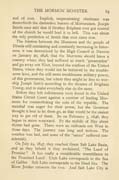
[p. 63]
rod of iron. Implicit, unquestioning obedience was thenceforth the distinctive feature of Mormonism. Joseph Smith once said that if Brother Brigham ever got control of the church he would lead it to hell. This was about the only prediction of Smith that ever came true.
The friction between the Mormons and the people of Illinois still continuing and constantly increasing in bitterness, it was determined by the High Council at Nauvoo on January 20, 1846, that the Mormons should leave a country where they had suffered so much "persecution" and go away out West, beyond the confines of the United States, where they would not be bothered by the trouble-some laws, and the still more troublesome military power, of this government, but where they might be free to worship Joseph Smith according to the dictates of Brigham Young, and to make everybody else do the same.
Before they left indictments were found in the United States Circuit Court against a number of leading Mormons for counterfeiting the coin of the republic. The marshal was eager for their arrest, but the Governor thought it best to let them go, as that would be the easiest way to get rid of them. So on February 5, 1846, they began to move westward. By the middle of May about 16,000 had gone. There were no railroads out West in those days. The journey was long and tedious. The weather was bad, and some of the "saints" suffered considerably.
On July 24, 1847, they reached Great Salt Lake Basin, and as they beheld it they exclaimed, "The Land of Promise." It has really a considerable resemblance to the Promised Land. Utah Lake corresponds to the Sea of Galilee. Salt Lake corresponds to the Dead Sea. The River Jordan connects the two. And Salt Lake City is
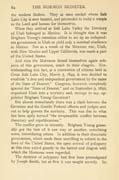
[p. 64]
the modern Sodom. They at once settled where Salt Lake City is now located, and proceeded to build a temple to the Lord and houses for themselves.
When they arrived at Salt Lake Valley the Territory of Utah belonged to Mexico. It is thought that it was Brigham Young's intention either to set up an independent government in Utah or yield only a nominal obedience to Mexico. But as a result of the Mexican, war, Utah, with New Mexico and Upper California, was made a part of the United States.
And thus the Mormons found themselves again subjects of this government, much to their chagrin. Not-withstanding this fact, at a convention of citizens held in Great Salt Lake City, March 5, 1849, it was decided to establish "a free and independent government by the name of the State of Deseret." Congress, however, completely ignored the "State of Deseret," and on September 9, 1850, organized Utah into a territory and, strange to say, appointed Brigham Young Governor!
But almost immediately there was a clash between the Governor and the Gentile Federal officers and judges sent out to help govern the territory. This was due to what has been aptly termed "the irrepressible conflict between theocracy and republicanism."
The conflict grew in intensity. Brigham Young generally got the best of it one way or another, outwitting some, intimidating others. In addition to their theocratic government, which made them unwilling to submit to the laws of the United States, the open avowal of polygamy at this time added greatly to the hatred and disgust with which the Mormons were regarded.
The doctrine of polygamy had first been promulgated by Joseph Smith, but at first it was taught secretly. Its
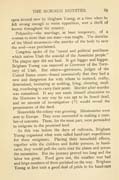
[p. 65]
open avowal now by Brigham Young, at a time when he felt strong enough to resist opposition, sent a thrill of horror throughout the country.
Polyandry—the marriage, at least temporary, of a woman to more than one man—was taught. The doctrine of the blood atonement—the murder of the body to save the soul—was proclaimed.
Congress spoke of the "moral and political pestilence which makes Utah the scandal of the American people." The plague spot did not heal. It got bigger and bigger. Brigham Young was removed as Governor of the Territory of Utah. But others—governors, judges of the United States court—found successively that they had a new and dangerous foe with whom to contend, crafty, determined, hesitating at nothing, lying, cheating, stealing, murdering to carry their point. Murder after murder was committed. If any one made himself obnoxious to the Mormons in any way he was apt to be found dead, and no amount of investigation (?) would reveal the perpetrators of the deed.
Meanwhile the colony was growing. Missionaries were sent to Europe. They were successful in making a number of converts. These, for the most part, were persuaded to emigrate to the promised land.
As this was before the days of railroads, Brigham Young organized what were called hand-cart expeditions for these emigrants. Placing their household effects, together with the children and feeble persons, in hand-carts, they would pull the carts over the plains and across the mountains. But the journey proved too long and the labor too great. Food gave out, the weather was bad and large numbers of them perished on the way. Brigham Young at first took a good deal of pride in his hand-cart
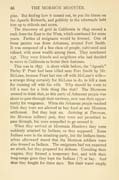
[p. 66]
plan. But finding how it turned out, he put the blame on the Apostle Richards, and publicly in the tabernacle held him up to ridicule and scorn.
The discovery of gold in California in 1849 caused a rush from the East to the West, which continued for some years. Parties of emigrants would be formed. One of these parties was from Arkansas, around Fort Smith. It was composed of a fine class of people, cultivated and refined, with some wealth among them. They numbered 137. They were friends and neighbors who had decided to move to California to better their fortunes.
This was in 1857. A short while before, the "Apostle" Parley P. Pratt had been killed near Fort Smith by Mr. McLean, because Pratt had run off with McLean's wife—a strange thing certainly for McLean to do, to kill a man for running off with his wife. Why should he want to kill a man for a little thing like that? The Mormons seemed to think that, as this party of Arkansas people was about to pass through their territory, now was their opportunity for vengeance. When the Arkansas people reached Utah they were not allowed to buy food at any Mormon settlement. But they kept on. Arriving at Parowan, the Mormon military post, they were not permitted to pass through, but were compelled to go around it.
When they arrived at Mountain Meadows they were suddenly attacked by Indians, as they supposed. Some Indians were in the attacking party, but the Indians themselves afterward stated that the Mormon soldiers were also dressed as Indians. The emigrants had not expected an attack, but they prepared for defense. Corraling their wagons, they formed a temporary fort, and with their long-range guns they kept the Indians (?) at bay. And thus they fought for three days. But their water supply
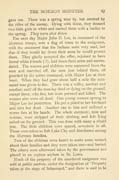
[p. 67]
gave out. There was a spring near by, but covered by the rifles of the enemy. Dying with thirst, they dressed two little girls in white and started them with a bucket to the spring. They were shot down.
The next day Major John D. Lee, in command of the Mormon troops, sent a flag of truce to the emigrants, with the statement that the Indians were very mad, but that if they would lay clown their arms he would protect them. They gladly accepted the offer, rejoiced to have found white friends (?), laid down their arms and surrendered. The women and children were separated from the men and marched off, the men just behind them, all guarded by the entire command, with Major Lee at their head. When they had gone about half a mile the command was given to fire. There was a volley, another and another, until all the men lay dead or dying on the ground, except three, who fled, but were pursued and killed. The women also were all dead. One young woman sprang to Major Lee for protection. He put a pistol to her forehead and shot her dead. Another ran to him and suffered a worse fate at his hands. The whole company, men and women, were stripped of their clothing and left lying naked on the ground. This was done with many a ribald jest. The little children were spared, seventeen in all. These were taken to Salt Lake City and distributed among the Mormon families.
Two of the children were heard to make some remark about their families and they were taken out—and buried. The others were afterward taken by the government and placed in an orphan asylum in St. Louis.
Much of the property of the murdered emigrants was sold at public auction, under the designation of "Property taken at the siege of Sebastopol," and there is said to be
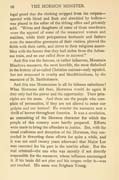
[p. 68]
legal proof that the clothing stripped from the corpses—spotted with blood and flesh and shredded by bullets—was placed in the cellar of the tithing office and privately sold. "Wives and daughters of some of those murderers wore the apparel of some of the massacred women and maidens, while their polygamous husbands and fathers wore the masculine garments of their victims, plowed the fields with their cattle, and drove to their religious assemblies with the horses that they had stolen from the Arkansas train, and no one called them to account."
And this was the famous, or rather infamous, Mountain Meadows massacre, the most horrible, the most diabolical in the history of so-called Christian nations'—only equaled, but not surpassed in cruelty and bloodthirstiness, by the massacre of St. Bartholomew.
And this was Mormonism in all its hideous nakedness! What Mormons did then, Mormons would do again if they only had the power and the opportunity. Their principles are the same. And these are the people who complain of persecution, if they are not allowd to enter our pulpits and our homes! No wonder the massacre sent a thrill of horror throughout America. It was a revelation, an unmasking of the Mormon character for which the people of this country were hardly prepared. Efforts were made to bring the offenders to justice. But, with the usual craftiness and deception of the Mormons, they succeeded in thwarting these efforts for quite a while, and it was not until twenty years afterward that Major Lee was executed for his part in the terrible affair. But the real criminal—the one who was morally if not directly responsible for the massacre, whose influence encouraged it, if his brain did not plan and his tongue order it—was not touched. His name was Brigham Young.
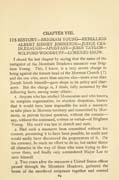
[p. 69]
CHAPTER VIII.
ITS HISTORY—BRIGHAM YOUNG—REBELLION ALBERT SIDNEY JOHNSTON—JUDGE CRADLEBAUGH—APOSTASY—JOHN TAYLOR—WILFORD WOODRUFF—LORENZO SNOW.
I closed the last chapter by saying that the name of the instigator of the Mountain Meadows massacre was Brigham Young. This, I know, is a very severe charge to bring against the former head of the Mormon Church (?) and the one who, more than anyone else—more even than Joseph Smith himself—gave shape to its policy and character. But the charge is, I think, fully sustained by the following facts, among many others:
1. Anyone who has studied Mormonism and who knows its complete organization, its absolute despotism, knows that it would have been impossible for such a massacre to take place in Mormon territory and committed by Mormons, as proven beyond question, without the consent—nay, without the command, written or verbal—of Brigham Young. His word was law in church and state.
2. Had such a massacre been committed without his consent, presuming it to have been possible, he could and would easily have discovered the perpetrators of it. On the contrary, he made no effort to do so, but rather threw all obstacles in the way of those who were trying to discover them, and finally only surrendered Major Lee to save himself.
3. Two years after the massacre a United States officer passed through the Mountain Meadows, gathered the bones of the murdered emigrants together and erected
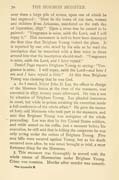
[p. 70]
over them a large pile of stones, upon one of which he had engraved:, "Here lie the bones of 120 men, women and children from Arkansas, murdered on the l0th day of September, 1857." Upon a cross tree he caused to be painted: "Vengeance is mine, saith the Lord, and I will repay it." This monument is said to have been destroyed the first time that Brigham Young visited the place. It is reported by one who stood by his side as he read the inscription that he remarked with a firm voice to those around him that the inscription should read: "Vengeance is mine, saith the Lord, and I have repaid." Daniel Page reports Brigham Young as saying: "Vengeance is mine. I will repay, saith the Lord—and here I am and I have repaid a little." At this time Brigham Young was claiming that he was God.
4. As I stated, Major John D. Lee, the officer in charge of the Mormon forces at the time of the massacre, was executed in 1877, twenty years afterward. He was a son by adoption of Brigham Young. Lee pleaded innocence in court, but while in prison awaiting his execution made a full confession of the whole affair.* He gave the names of forty odd Mormons who took part in the massacre, and said that Brigham Young was instigator of the whole proceeding. Lee was shot by five United States soldiers, and while seated on his coffin, just a moment before his execution, he still said that in killing the emigrants he was only acting under the orders of Brigham Young. Five true bills were secured against Young, but as his death occurred soon after, he was never brought to trial, a most fortunate thing for the Mormons.
5. This massacre was thoroughly in accord with the whole course of Mormonism under Brigham Young. Crime was common. Murder after murder was commit-
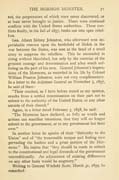
[p. 71]
ted, the perpetrators of which were never discovered, or at least never brought to justice. There were continual conflicts with the United States authorities. These conflicts finally, in the fall of 1857, broke out into open rebellion.
Gen. Albert Sidney Johnston, who afterward won imperishable renown upon the battlefield of Shiloh in the war between the States, was sent at the head of a small army to suppress the rebellion. This he succeeded in doing without bloodshed, but only by the exercise of the greatest courage and determination and after much suffering on the part of his men. General Johnston's impresssions of the Mormons, as recorded in his life by Colonel William Preston Johnston, were not very complimentary. In a letter to the Adjutant General on November 5, 1857, he said of them:
"Their conduct, as I have before stated as my opinion, results from a settled determination on their part not to submit to the authority of the United States, or any other outside of their church."
Again, in a letter dated February 5, 1858, he said:
"The Mormons have declared, as fully as words and actions can manifest intentions, that they will no longer submit to the government, or to any government but their own."
In another letter he speaks of their "disloyalty to the Union" and of "the treasonable temper and feeling now pervading the leaders and a great portion of the Mormons." He insists that "they should be made to submit to the constitutional and legal demands of the government unconditionally. An adjustment of existing differences on any other basis would be nugatory."
Writing to General Winfield Scott, March 31, 1859, he remarked:
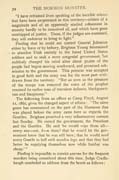
[p. 72]
"I have refrained from speaking of the horrible crimes that have been perpetrated in this territory—crimes of a magnitude and of an apparently studied refinement in atrocity hardly to be conceived of, and which have gone unwhipped of justice. These, if the judges are sustained, they will endeavor to bring to light."
Finding that he could not control General Johnston either by force or by bribery, Brigham Young determined to abandon Utah entirely to the hated United States soldiers and to seek a more congenial government, but suddenly changed his mind after about 30,000 of the people had begun moving southward, and promised submission to the government. This promise was accepted in good faith and the army was for the most part withdrawn from the territory. "But as soon as the pressure of the troops was removed the voice of the prophet resumed its earlier tone of truculent defiance, blackguardism and blasphemy."
The following from an officer at Camp Floyd, August 11, 1860, gives the changed aspect of affairs: "The same game has commenced on the part of the Mormons that was played before the army came here as regards the Gentiles. Brigham preached a very inflammatory sermon last Sunday. He cursed the government, the President and the Gentiles. He said 'he would wipe them all—every one—out, d—n them! that he would let the government know that he was still here; that he would send every Gentile to hell with wooden legs, and that they had better he supplying themselves now while lumber was cheap.'"
Finding it impossible to convict anyone for the frequent murders being committed about this time, Judge Cradlebaugh concluded an address from the bench as follows:
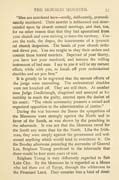
[p. 73]
"Men are murdered here—coolly, deliberately, premeditatedly murdered. Their murder is deliberated and determinded upon by church council meetings, and that, too, for no other reason than that they had apostatized from your church and were striving to leave the territory. You are the tools, the dupes, the instruments of a tyranniccal church despotism. The heads of your church order and direct you. You are taught to obey their orders and commit these horrid murders. Deprived of your liberty, you have lost your manhood, and become the willing instrument of bad men. I say to you it will be my earnest effort, while with you, to knock off your ecclesiastical shackles and set you free."
It is greatly to be regretted that the earnest efforts of the judge were unavailing. The ecclesiastical shackles were not knocked off. They are still there. At another time Judge Cradlebaugh, chagrined and annoyed at his inability to reach the guilty, entered upon the docket of his court: "The whole community presents a united and organized opposition to the administration of justice."
During the war between the States the sympathies of the Mormons were strongly against the North and in favor of the South, as was shown by the preaching in the tabernacle. It was not that the Mormons cared for the South any more than for the North. Like the Irish-man, they were simply against the government and welcomed anything which would tend to overthrow it. On the Sunday afternoon preceding the surrender of General Lee, Brigham Young predicted in the tabernacle that there would be four more years of war.
Brigham Young is very differently regarded in Salt Lake City. By the Mormons he is regarded as a Moses who led them out of Egypt, through the wilderness to the Promised Land. They consider him a kind of demi-
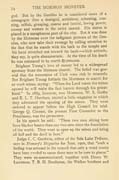
[p. 74]
god. But by the Gentiles he is considered more of a demagogue than a demigod, ambitious, scheming, cunning, selfish, grasping, coarse and lustful, loving power, money and women in the order named. His statue is placed in a conspicuous part of the city. But it was done by the Mormons over the indignant protests of the Gentiles, who now take their revenge by calling attention to the fact that he stands with his back to the temple and his hand stretched out toward the bank—which attitude, they say, is quite characteristic. At the time of his death he was estimated to be worth $7,000,000.
Brigham Young's love of money led to a widespread apostasy from the Mormon church. The belief was general that the mountains of Utah were rich in minerals. But Brigham Young forbade the Mormons to search for or work mines, saying: "When the Lord wants the mines opened he will make the fact known through his priesthood." In 1869, however, two Mormons, W. S. Godbe and E. L. T. Harrison, started a little magazine in which they advocated the opening of the mines. They were ordered to appear before the High Council for trial. George Q. Cannon, the present First Counselor to the Presidency, was the prosecutor.
In his speech he said: "These two men sitting here have blacker hearts than any two men since the foundation of the world. They want to open up the mines and bring all hell and the devil in here."
Judge C. C. Goodwin, editor of the Sale Lake Tribune, says in Munsey's Magazine for June, 1900, that "such a feeling was aroused in the council that only a word would have been reeded to cause these men to be torn to pieces." They were ex-communicated, together with Henry W. Lawrence, T. B. H. Stenhouse, the Walker brothers and
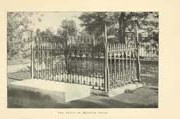
[p. unnumbered]
THE GRAVE OF BRIGHAM YOUNG.
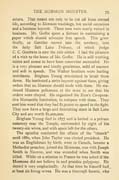
[p. 75]
others. That meant not only to be cut off from eternal life, according to Mormon teachings, but social ostracism and a business boycott. These men were nearly ruined in business. Mr. Godbe spent a fortune in maintaining a paper which should advocate free speech. This grew finally, as Gentiles moved into the territory, into the daily Salt Lake Tribune, of which Judge C. C. Goodwin is now the able editor. I had the pleasure of a visit to the home of Mr. Godbe. He is still working mines and seems to have been somewhat successful. He is a very pleasant and kindly gentleman, mild of manner and soft in speech. The Walker brothers were leading merchants. Brigham Young determined to break them down. He instituted a strict boycott against them, giving orders that no Mormon should trade with them. He stationed Mormon policemen at the store to see that his orders were obeyed. He organized the Zion's Cooperative Mercantile Institution, to compete with them. They sent him word that they had $150,000 to spend in the fight. They now have a large and flourishing store in Salt Lake City and are worth $1,000,000.
Brigham Young died in 1877 and is buried in a private cemetery near the Temple, surrounded by eight of his twenty-six wives, and with space left for the others.
The apostles conducted the affairs of the "church" until 1880, when John Taylor was elected president. He was an Englishman by birth, went to Canada, became a Methodist preacher, joined the Mormons, was with Joseph Smith in Nauvoo, and was wounded when Smith was killed. While on a mission to France he was asked if the Mormons did not believe in and practice polygamy. He denied it very emphatically. At that time he himself had at least six living wives. He was a thorough fanatic, who
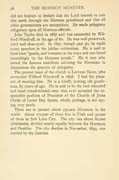
[p. 76]
did not hesitate to declare that the Lord intends to rule this earth through the Mormon priesthood and that all other governments are usurpations. He made polygamy obligatory upon all Mormon officials.
John Taylor died in 1887 and was succeeded by Wilford Woodruff, at the age of 80. He was well preserved, erect and clear-eyed. In 1897, though past 90, he made many speeches in the jubilee celebration. He is said to have been "gentle, and winsome in his ways and was loved exceedingly by the Mormon people." He it was who issued the famous manifesto advising the Mormons to discontinue the practice of polygamy.
The present head of the church is Lorenzo Snow, who succeeded Wilford Woodruff in 1898. I had the pleasure of meeting him. He is a kindly looking old gentleman, 85 years of age. He is said to be the best educated and most broad-minded man who ever occupied the responsible position of President of the Church of Jesus Christ of Latter Day Saints, which, perhaps, is not saying very much.
There are at present about 250,000 Mormons in the world. About 170,000 of these live in Utah and 30,000 of them in Salt Lake City. The city has about 60,000 inhabitants, divided nearly equally between the Mormons and Gentiles. The city election in November, 1899, was carried by the Gentiles.
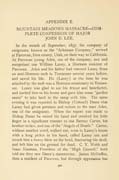
[p. 342]
APPENDIX E.
MOUNTAIN MEADOWS MASSACRE—COMPLETE CONFESSION OF MAJOR JOHN D. LEE.
In the month of September, 1857, the company of emigrants, known as the "Arkansas Company," arrived at Parowan, Iron county, Utah, on their way to California. At Parowan young Aden, one of the company, saw and recognized one William Laney, a Mormon resident of Parowan. Aden and his father had rescued Laney from an anti-Mormon mob in Tennessee several years before, and saved his life. He (Laney) at the time he was attacked by the mob was a Mormon missionary in Tennessee. Laney was glad to see his friend and benefactor, and invited him to his house and gave him some "garden sauce" to take back to the camp with him. The same evening it was reported to Bishop (Colonel) Dame that Laney had given potatoes and onions to the man Aden, one of the emigrants. When the report was made to Bishop Dame he raised his hand and crooked his little finger in a significant manner to one Barney Carter, his brother-in-law, and one of the "Angels of Death." Carter, without another word, walked out, went to Laney's house with a long picket in his hand, called Laney out and struck him a heavy blow on the head, fracturing his skull, and left him on the ground for dead. C. Y. Webb and Isaac Naoman, President of the "High Council," both told me they saw Dame's manœuvres. James McGuffee, then a resident of Parowan, but through oppression has
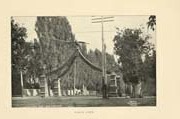
[p. unnumbered]
EAGLE GATE.
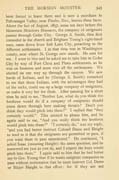
[p. 343]
been forced to leave there and is now a merchant in Pahranagat Valley, near Pioche, Nev., knows these facts. About the last of August, 1857, some ten days before the Mountain Meadows Massacre, the company of emigrants passed through Cedar City. George A. Smith, then first counselor in the church and Brigham Young's right-hand man, came down from Salt Lake City, preaching to the different settlements. I at that time was in Washington county, near where St. George now stands. He sent for me. I went to him and he asked me to take him to Cedar City by way of Fort Clara and Pinto settlements, as he was on business and must visit all the settlements. We started on our way up through the canyon. We saw herds of Indians, and he (George A. Smith) remarked to me that these Indians, with the advantages they had of the rocks, could use up a large company of emigrants, or make it very hot for them. After pausing for a short time he said to me, "Brother Lee, what do you think the brethren would do if a company of emigrants should come down through here making threats? Don't you think they would pitch into them?" I replied that "they certainly would." This seemed to please him, and he again said to me, "And you really think the brethren would pitch into them?" "I certainly do," was my reply, "and you had better instruct Colonel Dame and Haight to tend to it that the emigrants are permitted to pass, if you want them to pass unmolested." He continued, "I asked Isaac (meaning Haight) the same question, and he answered me just as you do, and I expect the boys would pitch into them." I again said to him that he had better say to Gov. Young that if he wants emigrant companies to pass without molestation that he must instruct Col. Dame or Major Haight to that effect: for if they are not
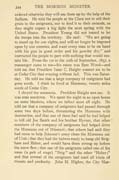
[p. 344]
ordered otherwise they will use them up by the help of the Indians. He told the people at the Clara not to sell their grain to the emigrants, nor to feed it to their animals, as they might expect a big fight the next spring with the United States. President Young did not intend to let the troops into the territory. He said: "We are going to stand tip for our rights, and will no longer be imposed upon by our enemies, and want every man to he on hand with his gun in good order and his powder dry," and instructed the people to part with nothing that would sustain life. From the 1st to the l0th of September, 1857, a messenger came to me—his name was Sam Wood—and told me that President Isaac C. Haight wanted me to he at Cedar City that evening without fail. This was Saturday. He told me that a large company of emigrants had gone south. I think he lived at Harmony, twenty miles south of Cedar City.
I obeyed the summons. President Haight met me. It was near sundown. We spent the night in an open house on some blankets, where we talked most all night. He told me that a company of emigrants had passed through some two days before, threatening the Mormons with destruction, and that one of them had said he had helped to kill old Joe Smith and his brother Hyrum, that other members of the company of emigrants had helped drive the Mormons out of Missouri; that others had said they had come to help Johnson's army clean the Mormons out of Utah; that they had the halters ready to hang old Brigham and Heber, and would have them strung up before the snow flew; that one of the emigrants called one of his oxen (a pair of stags) "Brig." and the other "Heber;" and that several of the emigrants had used all kinds of threats and profanity. John M. Higbee, the City Mar-
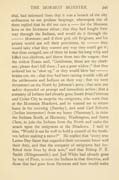
[p. 345]
shal, had informed them that it was a breach of the city ordinances to use profane language, whereupon one of them replied that he did not care a —— for the Mormon laws or the Mormons either; that they had fought their way through the Indians, and would do it through the —— Mormons; and if their god, old Brigham, and his priests would not sell their provisions, by —— they would take what they wanted any way they could get it; that thus enraged, one of them let loose his long whip and killed two chickens, and threw them into the wagon; that the widow Evans said, "Gentlemen, those are my chickens; please don't kill them; I am a poor widow;" that they ordered her to "shut tip," or they would blow her —— brains out, etc.; that they had been raising trouble with all the settlements and Indians on their way; that we were threatened on the North by Johnson's army; that now our safety depended on prompt and immediate action; that a company of Indians had already gone South from Parowan and Cedar City to surprise the emigrants, who were then at the Mountain Meadows, and he wanted me to return home in the morning (Sunday), and send Carl Schurtz (Indian interpreter) from my home (Harmony), to raise the Indians South, at Harmony, Washington, and Santa Clara, to join the Indians from the North and make the attack upon the emigrants at the Meadows. I said to him, "Would it not be well to hold a council of the brethren before making a move?" He replied that "every true Latter-Day Saint that regarded their covenants knew well their duty, and that the company of emigrants had forfeited their lives by their acts," and that Bishop P. K. Smith (Klingensmith) and Joel White had already gone by way of Pinto, to raise the Indians in that direction, and those that had gone from Parowan and here would make
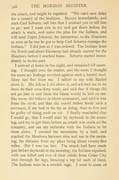
[p. 346]
the attack, and might be repulsed. "We can't now delay for a council of the brethren. Return immediately, and start Carl Schurtz; tell him that I ordered you to tell him to go; and I want you to try and get there before the attack is made, and make the plan for the Indians, and will send Nephi Johnson, the interpreter, to the Meadows as soon as he can be got to help Carl Schurtz manage the Indians." I did just as I was ordered. The Indians from the North and about Harmony had already started for the Meadows before I reached home. Carl Schurtz started immediately to do his part.
I arrived at home in the night, and remained till morning. I thought over the matter, and the more I thought the more my feelings revolted against such a horrid deed. Sleep had fled from me. I talked to my wife Rachel about it. She felt as I did about it, and advised me to let them do their own dirty work, and said that if things did not go just to suit them the blame would be laid on me. She never did believe in blood atonement, and said it was from the devil, and that she would rather break such a covenant, if she had to die for so doing, than to live and be guilty of doing such an act. I finally concluded that I would go, that I would start by daybreak in the morning, and try to get there before an attack was made on the company, and use my influence with the Indians to let them alone. I crossed the mountains by a trail, and reached the Meadows between nine and ten in the morning, the distance from my place being about twenty-five miles. But I was too late. The attack had been made just before daybreak in the morning, the Indians repulsed, with one killed and two of their chiefs from Cedar City shot through the legs, breaking a leg for each of them. The Indians were in a terrible rage. I went to some of
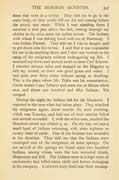
[p. 347]
them that were in a ravine. They told me to go to the main body, or they would kill me for not coming before the attack was made. While I was standing there I received a shot just above the belt, cutting through my clothes to the skin, some six inches across. The Indians with whom I was talking lived with me at Harmony. I was Indian Farmer. They told me I was in danger, and to get down into the ravine. I said that it was impossible for me to do anything there, and I dare not venture to the camp of the emigrants without endangering my life. I mounted my horse and started south to meet Carl Schurtz. I traveled sixteen miles and stopped on the Megotsy to bait my animal, as there was good grass and water. I had rode over forty miles without eating or drinking. This is the place where Mr. Tobin met his assassinators. About sunset I saw Schurtz and some ten or fifteen white men and about one hundred and fifty Indians. We camped.
During the night the Indians left for the Meadows. I reported to the men what had taken place. They attacked the emigrants again, about sunrise the next morning, which was Tuesday, and had one of their number killed and several wounded. I, with the white men, reached the Meadows about one o'clock p. m. On the way we met a small band of Indians returning, with some eighteen or twenty head of cattle. One of the Indians was wounded in the shoulder. They told me that the Indians were encamped east of the emigrants, at some springs. On our arrival at the springs we found some two hundred Indians, among whom were the two wounded chiefs, Moqueetus and Bill. The Indians were in a high state of excitement; had killed many cattle and horses belonging to the company. I counted sixty head near their encamp-
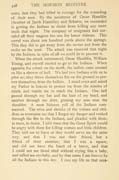
[p. 348]
ment, that they had killed in revenge for the wounding of their men. By the assistance of Oscar Hamblin (brother of Jacob Hamblin) and Schurtz, we succeeded in getting the Indians to desist from killing any more stock that night. The company of emigrants had corraled all their wagons but one for better defense. This corral was about one hundred yards above the springs. This they did to get away from the ravine and from the rocks on the west. The attack was renewed that night by the Indians, in spite of all we could do to prevent it.
When the attack commenced, Oscar Hamblin, William Young, and myself started to go to the Indians. When opposite the corral, on the north, the bullets came around us like a shower of hail. We had two Indians with us to pilot us; they threw themselves flat on the ground to protect themselves from the bullets. I stood erect and asked my Father in heaven to protect me from the missies of death, and enable me to reach the Indians. One ball passed through my hat and the hair of my head, and another through my shirt, grazing my arm near the shoulder. A most hideous yell of the Indians commenced. The cries and shrieks of the women and children so overcame me that I forgot my danger and rushed through the fire to the Indians, and pleaded with them, in tears, to desist. I told them that the Great Spirit would be angry with them for killing women and little children. They told me to leave or they would serve me the same way, and that I was not their friend, but a friend of their enemies; that I was a squaw, and did not have the heart of a brave, and that I could not see blood shed without crying like a baby, and called me cry-baby, and by that name I am known by all the Indians to this day. I owe my life on that occa-
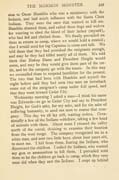
[p. 349]
sion to Oscar Hamblin who was a missionary with the Indians, and had much influence with the Santa Clara Indians. They were the ones that wanted to kill me. Hamblin shamed them, and called them dogs and wolves for wanting to shed the blood of their father (myself), who had fed and clothed them. We finally prevailed on them to return to camp, where we would hold a council; that I would send for big Captains to come and talk. We told them that they had punished the emigrants enough, and may be they had killed nearly all of them. We told them that Bishop Dame and President Haight would come, and may be they would give them part of the cattle, and let the company go with the teams. In this way we reconciled them to suspend hostilities for the present. The two that had been with Hamblin and myself the night before said they had seen two men on horseback come out of the emigrant's camp under full speed, and that they went toward Cedar City.
Wednesday morning I asked a man—I think his name was Edwards—to go to Cedar City and say to President Haight, for God's sake, for my sake, and for the sake of suffering humanity, to send out men to rescue that company. This day we all lay still, waiting orders. Occasionally a few of the Indians withdrew, taking a few head of animals with them. 'About noon I crossed the valley north of the corral, thinking to examine their location from the west range. The company recognized me as a white man, and sent two little boys, about four years old, to meet me. I hid from them, fearing the Indians, who discovered the children. I called the Indians, who wanted my gun or ammunition to kill them. I prevailed with them to let the children go back to camp, which they very soon did when they saw the Indians. I crept up behind
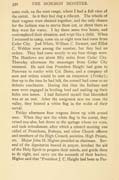
[p. 350]
some rock, on the west range, where I had a full view of the corral. In it they had dug a rifle-pit. The wheels of their wagons were chained together, and the only chance for the Indians was to starve them out, or shoot them as they went for water. I lay there some two hours, and contemplated their situation, and wept like a child. When I returned to camp, some six or eight men had come from Cedar City. Joel White, William C. Stewart, and Elliot C. Weldon were among the number, but they had no orders. They had come merely to see how things were. The Meadows are about fifty miles from Cedar City. Thursday afternoon the messenger from Cedar City returned. He said that President Haight had gone to Parowan to confer with Col. Dame, and a company of men and orders would be sent on tomorrow (Friday); that up to the time he had left, the council had come to no definite conclusion. During this time the Indians and men were engaged in broiling beef and making up their hides into lassos. I had flattered myself that bloodshed was at an end. After the emigrants saw me cross the valley, they hoisted a white flag in the midst of their corral.
Friday afternoon four wagons drove up with armed men. When they saw the white flag in the corral, they raised one also, but drove to the springs where we were, and took refreshment, after which a council meeting was called of Presidents, Bishops, and other Church officers and members of the High Council, societies, High Priests, etc. Major John M. Higbee presided as chairman. Several of the dignitaries bowed in prayer, invoked the aid of the Holy Spirit to prepare their minds, and guide them to do right, and carry out the counsels of their leaders. Higbee said that "President J. C. Haight had been to Par-
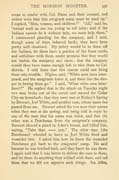
[p. 351]
owan to confer with Col. Dame and their counsel, and orders were that this emigrant camp must be used up." I replied, "Men, women, and children?" "All," said he, "except such as are too young to tell tales; and if the Indians cannot do it without help, we must help them." I commenced pleading for the company, and I said, though some of them behaved badly, they have been pretty well chastised. My policy would be to draw off the Indians, let them have a portion of the loose cattle, and withdraw with them, under promise that they would not molest the company any more; that the company would then have teams enough left to take them to California. I told them that this course could not bring them into trouble. Higbee said, "White men have interposed, and the emigrants know it, and there lies the danger in letting them go." I said, "What white man interfered?" He replied that in the attack on Tuesday night two men broke out of the corral and started for Cedar City on horseback; that they were met at Richey's Spring by Stewart, Joel White, and another man, whose name has passed from me. Stewart asked the two men their names when they met at the spring, and being told in reply by one of the men that his name was Aden, and that the other was a Dutchman from the emigrant's company, Stewart shoved a pistol to Aden's breast, and killed him, saying, "Take that, —— you." The other man (the Dutchman) wheeled to leave as Joel White fired and wounded him. I asked him how he knew the wounded Dutchman got back to the emigrants' camp. He said because he was tracked back, and they knew he was there. I again said that it was better to deliver the man to them, and let them do anything they wished with them, and tell them that we did not approve such things. Ira Allen,
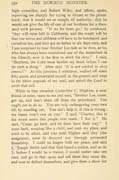
[p. 352]
high councillor, and Robert Wiley, and others, spoke, reproving me sharply for trying to dictate to the priesthood; that it would set at naught all authority; that he would not give the life of one of our brethren for a thousand such persons. "If we let them go," he continued, "they will raise hell in California, and the result will be that our wives and children will have to be butchered, and ourselves too, and they are no better to die than ours, and I am surprised to hear Brother Lee talk as he does, as he, who has always been considered one of the staunchest in the Church, now is the first to shirk his duty." I said, "Brethren, the Lord must harden my heart before I can do such a thing." Allen said, "It is not wicked to obey counsel." At this juncture I withdrew, walked off some fifty paces, and prostrated myself on the ground and wept in the bitter anguish of my soul, and asked the Lord to avert that evil.
While in that situation Councillor C. Hopkins, a near friend of mine, came to me and said, "Brother Lee, come, get up, and don't draw off from the priesthood. You ought not to do so. You are only endangering your own life by standing out. You can't help it, if this is wrong; the blame won't rest on you." I said, "Charley, this is the worst move this people ever made; I feel it." He said, "Come, go back, and let them have their way." I went back, weeping like a child, and took my place, and tried to be silent, and was until Higbee said they (the emigrants) must be decoyed out through pretended friendship. I could no longer hold my peace, and said I, "Joseph Smith said that God hated a traitor, and so do I: before I would be a traitor, I would rather take ten men, and go to that camp and tell them they must die, and now to defend themselves, and give them a show for
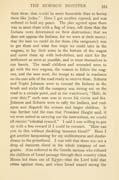
[p. 353]
their lives; that would be more honorable than to betray them like Judas." Here I got another reproof, and was ordered to hold my peace. The plan agreed upon there was to meet them with a flag of truce, tell them that the Indians were determined on their destruction; that we dare not oppose the Indians, for we were at their mercy; that the best we could do for them (the emigrants) was to get them and what few traps we could take in the wagons, to lay their arms in the bottom of the wagon and cover them up with bed-clothes, and start for the settlement as soon as possible, and to trust themselves in our hands. The small children and wounded were to go with the two wagons, the women to follow the wagons, and the men next, the troops to stand in readiness on the east side of the road ready to receive them. Schurtz and Nephi Johnson were to conceal the Indians in the brush and rocks till the company was strung out on the road to a certain point, and at the watchword, "Halt; do your duty!" each man was to cover his victim and fire. Johnson and Schurtz were to rally the Indians, and rush upon and dispatch the women and larger children. It was further told the men that President Haight said, if we were united in carrying out the instructions, we would all receive "celestial reward." I said I was willing to put up with a less reward if I could be excused. "How can you do this without shedding innocent blood?" Here I got another lampooning for my stubbornness and disobedience to the priesthood. I was told that there was not a drop of innocent blood in the whole company of emigrants. Also referred to the Gentile nations who refused the children of Israel passage through their country when Moses led them out of Egypt—that the Lord held that crime against them, and when Israel waxed strong the
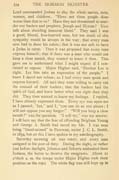
[p. 354]
Lord commanded Joshua to slay the whole nation, men, women, and children.. "Have not these people done worse than that to us? Have they not threatened to murder our leaders and prophets, Joseph and Hyrum? Now talk about shedding innocent blood." They said I was a good, liberal, free-hearted man, but too much of this sympathy would be always in the way; that every man now had to show his colors; that it was not safe to have a Judas in camp. Then it was proposed that every man express himself; that if there was a man who would not keep a close mouth, they wanted to know it then. This gave me to understand what I might expect if I continued to oppose. Major Higbee said, "Brother Lee is right. Let him take an expression of the people." I knew I dared not refuse; so I had every man speak and express himself. All said they were willing to carry out the counsel of their leaders; that the leaders had the spirit of God, and knew better what was right than they did. They then wanted to know my feelings. I replied, I have already expressed them. Every eye was upon me as I paused; "but," said I, "you can do as you please; I will not oppose you any longer." "Will you keep a close mouth?" was the question. "I will try," was my answer. I will here say that the fear of offending Brigham Young and George A. Smith had saved my life. I was near being "blood-atoned" in Farman, under J. C. L. Smith, in 1854, but on this I have spoken in my autobiography.
Saturday morning all was ready, and every man assigned to his post of duty. During the night, or rather just before daylight, Johnson and Schurtz ambushed their Indians, the better to deceive the emigrants. About 11 o'clock a. m. the troops under Major Higbee took their position on the road. The white flag was still kept up in
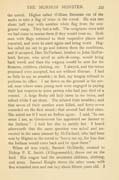
[p. 355]
the corral. Higbee called William Bateman out of the ranks to take a flag of truce to the corral. He was met about half way with another white flag from the emigrants' camp. They had a talk. The emigrants were told we had come to rescue them if they would trust us. Both men with flags returned to their respective places and reported, and were to meet again and bring word. Higbee called me out to go and inform them the conditions, and if accepted, Dan McFarland, brother to John McFarland, lawyer, who acted as aide-de-camp, would bring hack word, and then the wagons would be sent for the firearms, children, clothing, etc. I obeyed, and the terms proposed were accepted, but not without distrust. I had as little to say as possible; in fact, my tongue refused to perform its office. I sat down on the ground in the corral, near where some young men were engaged in paying their last respects to some person who had just died of a wound. A large fleshy old lady came to me twice, and talked while I sat there. She related their troubles; said that seven of their number were killed, and forty-seven wounded on the first attack; that several had died since. She asked me if I were an Indian agent. I said, "In one sense I am, as Government has appointed me farmer to the Indians." I told her this to satisfy her. I heard afterwards that the same question was asked and answered in the same manner by McFarland, who had been sent by Higbee to the corral to "hurry me up, for fear that the Indians would come back and be upon them."
When all was ready, Samuel McMurdy, counsel to Bishop P. K. Smith (Klingensmith), drove out on the lead. His wagon had the seventeen children, clothing, and arms. Samuel Knight drove the other team, with five wounded men and one boy about fifteen years old. I
ANN ELIZA WEBB WIFE OF BRIGHAM YOUNG POPULARLY KNOWN AS NO.19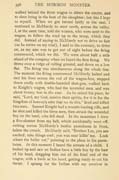
[p. 356]
walked behind the front wagon to direct the course, and to shun being in the heat of the slaughter; but this I kept to myself. When we got turned fairly to the east, I motioned to McMurdy to steer north, across the valley. I, at the same time, told the women, who were next to the wagon, to follow the road up to the troop, which they did. Instead of saying to McMurdy not to drive so fast (as he swore on my trial), I said to the contrary, to drive on, as my aim was to get out of sight before the firing commenced, which we did. We were about half a mile ahead of the company when we heard the first firing. We drove over a ridge of rolling ground, and down on a low flat. The firing was simultaneous along the whole line. The moment the firing commenced McMurdy halted and tied his lines across the rod of the wagon-box, stepped down coolly with double-barreled shot-gun, walked back to Knight's wagon, who had the wounded men, and was about twenty feet in the rear. As he raised his piece, he said, "Lord, my God, receive their spirits, for it is for the kingdom of heaven's sake that we do this," fired and killed two men. Samuel Knight had a muzzle-loading rifle, and he shot and killed the three men, then struck the wounded boy on the head, who fell dead. In the meantime I drew a five-shooter from my belt, which accidentally went off, cutting across McMurdy's buskin pantaloons in front, below the crotch. McMurdy said, "Brother Lee, you are excited; take things cool; you was near killin' me. Look where the bullet cut," pointing to the place in his pantaloons. At this moment I heard the scream of a child. I looked up and saw an Indian have a little boy by the hair of his head, dragging him out of the hind end of the wagon, with a knife in his hand. getting ready to cut his throat. I sprang for the Indian with my revolver in
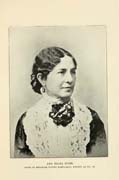
[p. unnumbered]
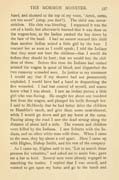
[p. 357]
hand, and shouted to the top of my voice, "Arick, oomo, cot too sooet" (stop, you fool!). The child was terror-stricken. His chin was bleeding. I supposed it was the cut of a knife, but afterwards learned that it was done on the wagon-box, as the Indian yanked the boy down by the hair of the head. I had no sooner rescued this child than another Indian seized a little girl by the hair. I rescued her as soon as I could speak; I told the Indians that they must not hurt the children—that I would die before they should be hurt; that we would buy the children of them. Before this time the Indians had rushed around the wagon in quest of blood, and dispatched the two runaway wounded men. In justice to my statement I would say that if my shooter had not prematurely exploded, I would have had a hand in despatching the five wounded. I had lost control of myself, and scarce knew what I was about. I saw an Indian pursue a little girl who was fleeing. He caught her about one hundred feet from the wagon, and plunged his knife through her. I said to McMurdy that he had better drive the children to Hamblin's ranch, and give them some nourishment, while I would go down and get my horse at the camp. Passing along the road I saw the dead strung along the distance of about half a mile. The women and children were killed by the Indians. I saw Schurtz with the Indians, and no other white man with them. When I came to the men, they lay about a rod apart. Here I came up with Higbee, Bishop Smith, and the rest of the company.
As I came up, Higbee said to me, "Let us search these persons for valuables," and asked me to assist him; gave me a hat to hold. Several men were already engaged in searching the bodies. I replied that I was unwell, and wanted to get upon my horse and go to the ranch and
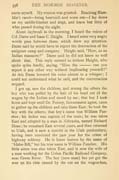
[p. 358]
nurse myself. My request was granted. Reaching Hamblin's ranch—being heartsick and worn out—I lay down on my saddle-blanket and slept, and knew but little of what passed during the night.
About daybreak in the morning, I heard the voices of Col. Dame and Isaac C. Haight. I heard some very angry words pass between them, which drew my attention. Dame said he would have to report the destruction of the emigrant camp and company. Haight said, "How, as an Indian massacre?" Dame said he did not know so well about that. This reply seemed to irritate Haight, who spoke quite loudly, saying, "How the —— can you report it any other way without implicating yourself?" At this Dame lowered his voice almost to a whisper; I could not understand what he said, and the conversation stopped.
I got up, saw the children, and among the others the boy who was pulled by the hair of his head out of the wagon by the Indian and saved by me; that boy I took home and kept until Dr. Forney, Government agent, came to gather up the children and take them East; he took the boy with the others; that boy's name was William Fancher; his father was captain of the train; he was taken East and adopted by a man in Nebraska, named Richard Sloan; he remained East several years, and then returned to Utah, and is now a convict in the Utah penitentiary, having been convicted the past year for the crime of highway robbery. He is know known by the name of "Idaho Bill," but his true name is William Fancher. His little sister was also taken East, and is now the wife of a man working for the Union Pacific Railroad Company, near Green River. The boy (now man) has yet got the scar on his chin caused by the cut on the wagon-box,
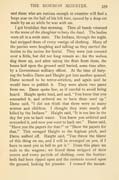
[p. 359]
and those who are curious enough to examine will find a large scar on the ball of his left foot, caused by a deep cut made by an as while he was with me.
I got breakfast that morning. Then all hands returned to the scene of the slaughter to bury the dead. The bodies were all in a nude state. The Indians, through the night, had stripped them of every vestige of clothing. Many of the parties were laughing and talking as they carried the bodies to the ravine for burial. They were just covered over a little, but did not long remain so; for the wolves dug them up, and after eating the flesh from them, the bones laid upon the ground until buried, some time after, by a Government military officer. At the time of burying the bodies Dame and Haight got into another quarrel. Dame seemed to be terror-stricken, and again said he would have to publish it. They were about two paces from me. Dame spoke low, as if careful to avoid being heard. Haight spoke loud, and said, "You know that you counseled it, and ordered me to have them used up." Dame said, "I did not think that there were so many women and children. I thought they were nearly all killed by the Indians." Haight said, "It is too late in the day for you to back water. You know you ordered and counseled it, and now you want to back out." Dame said, "Have you the papers for that?" or "Show the papers for that." This enraged Haight to the highest pitch, and Dame walked off. Haight said, "You throw the blame of this thing on me, and I will be revenged on you, if I have to meet you in hell to get it." From this place we rode to the wagons; we found them stripped of their covers and every particle of clothing, even the feather-beds had been ripped open and the contents turned upon the ground, looking for plunder. I crossed the mount-
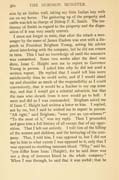
[p. 360]
ains by an Indian trail, taking my little Indian boy with me on my horse. The gathering up of the property and cattle was left in charge of Bishop P. K. Smith. The testimony of Smith in regard to the property and the disposition of it was very nearly correct.
I must not forget to state, that after the attack a messenger by the name of James Haslem was sent with a dispatch to President Brigham Young, asking his advice about interfering with the company, but he did not return in time. This I had no knowledge of until the massacre was committed. Some two weeks after the deed was done, Isaac C. Haight sent me to report to Governor Young in person. I asked him why he did not send a written report. He replied that I could tell him more satisfactorily than he could write, and if I would stand up and shoulder as much of the responsibility as I could conveniently, that it would be a feather in my cap some day, and that I would get a celestial salvation, but that the man who shrank from it now would go to hell. I went and did as I was commanded. Brigham asked me if Isaac C. Haight had written a letter to him. I replied, not by me, but I said he wished me to report in person. "All right," said Brigham; "were you an eye-witness?" "To the most of it," was my reply. Then I proceeded and gave him a full history of all except that of my opposition. That I left out entirely. I told him of the killing of the women and children, and the betraying of the company. That, I told him, I was opposed to, but I did not say to him to what extent I was opposed to it, only that I was opposed to shedding innocent blood. "Why," said he, "you differ from Isaac (Haight), for he said there was not a drop of innocent blood in the whole company." When I was through, he said that it was awful; that he
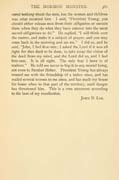
[p. 361]
cared nothing about the men, but the women and children was what troubled him. I said, "President Young, you should either release men from their obligation or sustain them when they do what they have entered into the most sacred obligations to do." He replied, "I will think over the matter, and make it a subject of prayer, and you may come back in the morning and see me." I did so, and he said, "John, I feel first-rate; I asked the Lord if it was all right for that deed to be done, to take away the vision of the deed from my mind, and the Lord did so, and I feel first-rate. It is all right. The only fear I have is of traitors." He told me never to lisp it to any mortal being, not even to Brother Heber. President Young has always treated me with the friendship of a father since, and has sealed several women to me since, and has made my house his home when in that part of the territory, until danger has threatened him. This is a true statement according to the best of my recollection.
JOHN D. LEE.